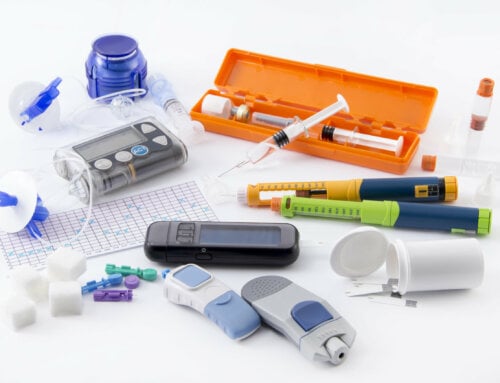As a CDE/RN, I am often asked questions relating to diabetes. I have picked the ones most frequently asked and hope that they answer some of your questions.
Question 1: Most glucose meters come with a control solution. What is it used for and why is it important? How can I order a refill when it is empty or expired?
Answer: The control solution which is meter specific serves a valuable purpose. It indicates if the strips are fresh or have been exposed to heat, cold, artificial light or humidity. Test strips are comfortable at the same temperature as we are, between 55 and 80 degrees Fahrenheit. The strips are coated with a chemical that can be less effective over time. After 4 months, an open bottle of strips should be thrown out. The control solution should be used the very first time with a new meter as well as with the first strip of each new bottle. The control solution is sugar water. Place a test strip in the meter, as you regularly do, and place a drop of solution on the pad of the strip. When ready, the number should fall between the ranges offered on the back of the bottle of strips (it has nothing to do with your blood). If the number falls outside the range after two test strips, you should return the strips to your supplier. Remember to gently shake the control solution prior to each use. Also, date the solution. Once opened, the solution will last for 3 months. Contact your supplier for replacement of the control solution.
Question 2: Diabetes or hyperglycemia means high blood sugar. Why would I carry glucose tablets for lows? How many should I take?
Answer: Because you have diabetes, you are more at risk for low blood sugar or hypoglycemia as well. Certain situations can cause low blood sugars such as exercising, taking insulin, taking sulfonylureas, skipping meals, eating too few carbohydrates or drinking alcohol. Being prepared with glucose tabs will help prevent going too low but can also prevent over treatment. Taking 3-4 glucose tablets (15 grams) will give you a fixed calorie amount and not swing you back to high blood sugars. Glucose gets into your system quickly which will relieve the symptoms of sweating, weakness, and shaking, fast. You may need to follow up with a snack or meal.
Question 3: Why is it that I can eat the same meal everyday yet my blood sugars can bounce around?
Answer: Eating definitely has an impact on your daily blood sugars especially when consuming large amounts of carbohydrates like rice, noodles, bread, potatoes, cereal, fruit, milk, or yogurt. Blood sugars can also be influenced by the amount of other types of food (protein), so even a huge steak will eventually raise your sugar. Many other things can influence blood sugar trends – such as stress, illness, injury, pain, lack of sleep, or steroid medication. Your sugar will fluctuate but if it remains in the acceptable range (80-150), you are O.K.
Question 4: Why should I worry about my blood pressure and cholesterol when I have diabetes which is a sugar disease?
Answer: People with diabetes have a 4-6% increased risk of heart attack or stroke over the person without diabetes. Almost 67% of people with diabetes have a blood pressure equal to or above 140/90, which is also a risk factor of heart disease. We call it the ABCs of diabetes because we have to control our blood pressure below 130/80, our LDL cholesterol should be around 70 or less, our HDL cholesterol should be around 45-50 and our triglycerides should be below 150. Sugar in the blood stream causes inflammation which is strongly tied to heart disease. Try to test your blood pressure with a digital cuff three times a week at varying times of the day and report this information to your physician along with your log book of blood sugars. Have your lipid profile checked yearly.
Question 5: I take all my medications in the morning on an empty stomach. Is that O.K.?
Answer: No. Each medication should be looked at separately and checked with your physician as to the timing as well as if it should be taken with or without food. Your pharmacist is also an excellent reference. Examples are thyroid medicine, which needs to be taken an hour prior to your other meds. Metformin should be taken with food. Statins should be taken in the evening as well as certain blood pressure meds. Calcium dosage should be split unless they are slow acting. The list goes on, so check before taking.ach use. Also, date the solution. Once opened, the solution will last for 3 months. Contact your supplier for replacement of the control solution.
These are just a small sample of questions often asked by patients. Hope they help you as well!
NOTE: Consult your doctor first to make sure my recommendations fit your special health needs.






Leave A Comment